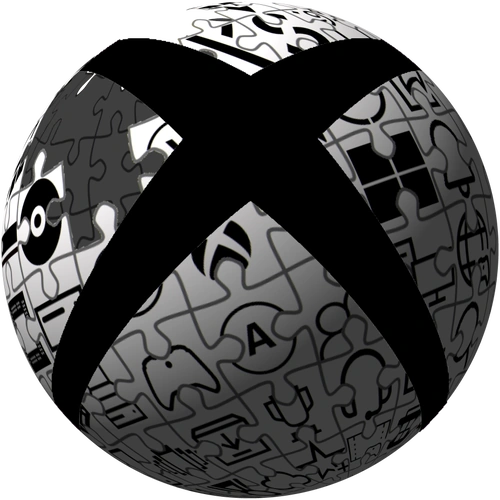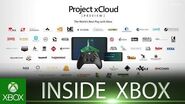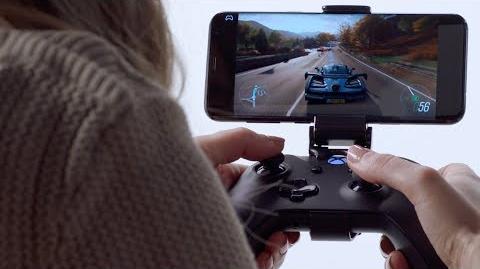| This article has encountered the Red Ring of Death!
This article has a few issues that need fixing. It may contain incorrect information or be formatted in a messy way. You can help Xbox Wiki by cleaning the article up and making sure it follows the edit poilcies. |
Xbox Cloud Gaming (formerly known as Project xCloud and colloquially referred to as xCloud) is a video game streaming service that allows users to play select Xbox titles on a variety of different platforms without the need to download them. The service has frequently been described as "Netflix for games". The service is available on Android, iOS, iPadOS and Windows 10 and 11 PCs.
The service was first made available to select Xbox Insiders in late 2019, with a range of different games being available to play from Android devices. Testing eventually expanded to iOS devices as well as Windows 10 PC's. The service was later made available to the public through Xbox Game Pass Ultimate at no additional cost.
During gamescom 2021, Xbox announced that the service would be expanding to Xbox One and Xbox Series X|S consoles in the future. Allowing users to play next generation titles on their Xbox One consoles, as well as playing any game in the service's catalogue without needing to download it. Testing for these consoles will be made available to Insiders some time in Fall 2021 with a full release expected for the end of the year.
Development[]
Prior to release, Xbox Cloud Gaming was known as Project xCloud. Work on the service has been reported to have been going on since 2013, five years prior to its official announcement at E3 2018. Games such as Halo 4 were able to successfully run on a range of smart phones during testing. Due to the service being too costly at the time, work was scaled down on xCloud.
During E3 2018, head of Xbox Phil Spencer officially revealed that xCloud was still being worked on and stated that they planned to expand it to the Xbox One range of consoles and the next generation of Xbox as well. While little detail on the service was announced at E3, much more information would be revealed in the months to come.
A few months later after the small tease at E3 2018, Project xCloud finally got an official announcement through Microsoft's YouTube channel. The video showed details of how the service would function and showcased numerous Xbox One games such as Forza Horizon 4 and Halo 5: Guardians being played on smart phones and tablets with and without Xbox controllers. During this video Microsoft confirmed that they planned to merge four custom Xbox consoles stripped-down into modular server blades to get the service to work. Combined with Microsoft's 54 Azure reigons across the world, more of the infastrctures are planned to be constructed across countries to keep the service running at a smooth rate all the time no matter where the player may be.
During GDC 2019, Microsoft discussed how they are adapting games to work with xCloud, with their new Cloud Aware APIs that will allow developers to build upon existing Xbox One code with device-aware features, only enabled when streaming a title.
Trials[]
At E3 2019 Microsoft announced that public trials would begin to role out later in the year. The dates for public trials were later revealed to be held in mid October, with only a limited number of people being selected to participate in the trial.
To apply for the trials users had to be from the United States, the United Kingdom or South Korea and have access to a Samsung smart phone. Three games; Halo 5: Guardians, Sea of Thieves and Gears 5 were the only titles available in the first test. An additional 50 games were later announced for the trial at X019, including Forza Horizon 4 and Crackdown 3.
In January 2020, Microsoft expanded trials to all regions that the Xbox One is available in.
Release[]
In 2017, Phil Spencer estimated the Xbox streaming service will hit the market "in the next three years" setting its full release date for 2020, or prior.
On July 16, 2020, Phil Spencer revealed in an Xbox Wire post that xCloud would launch in all supported countries in September. The blogpost also revealed that xCloud would be included with Xbox Game Pass Ultimate at no additional cost.
In another Xbox Wire post published on August 5, 2020, it was announced that xCloud would launch for Samsung devices with Xbox Game Pass Ultimate on September 15, 2020, with over 100 games being available at the services launch[1].
Games[]
A subcription to Xbox Game Pass Ultimate is necessary to be able to play games via XboxCloud. or you can also use Microsoft's gamin stream on your mobile or PC.[2]
Microsoft previously discussed several major Xbox One games that would be included with Project xCloud. Various games were seen in the announcement trailer such as Forza Horizon 4, Halo 5: Guardians, Gears of War 4, Sea of Thieves, and Cuphead streaming live via the technology. Titles likeRockstar Games' Red Dead Redemption 2 have also been named to be playable on the service.
In Microsoft's initial announcement video for Project xCloud, the company touched on the seamless onboarding process for game developers. Microsoft also stated that studios will have the ability to deploy their games with "no additional work," indicating a huge lineup should be able to be played on the service when it launches.
Name and branding[]
When the launch date of the service was revealed by Phil Spencer, the final name of the service was also discussed.
| “ | This isn’t the official name, but you should think about it as Game Pass streaming or Xbox streaming, something like that, we actually don’t have the final name just yet, but it won’t be Project xCloud | ” |
—Phil Spencer discussing the final name of xCloud. | ||
During this time it was revealed that a final name for xCloud has not been decided on yet. Xbox Cloud Gaming was later revealed as the services final name.












